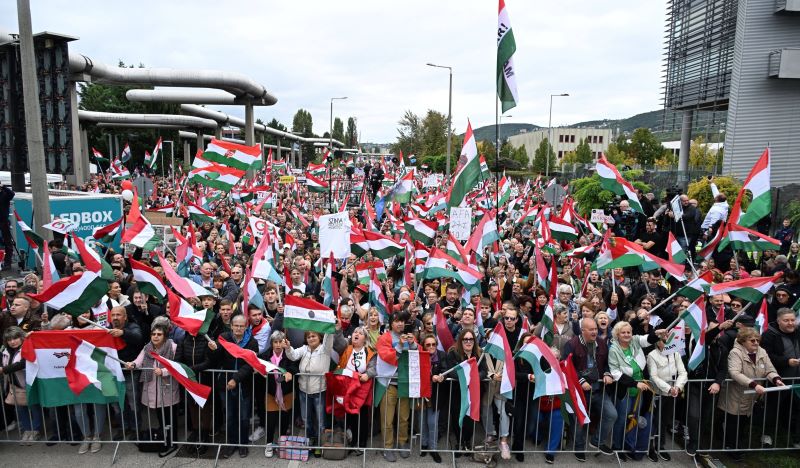Budapest — Thousands of Hungarians gathered in front of the headquarters of the state-run public media corporation on Saturday, led by opposition figure Péter Magyar, to protest what they describe as a “propaganda machine” operated by Prime Minister Viktor Orbán’s nationalist government.
The demonstration, organized by the rising TISZA party and its leader Péter Magyar, represents the most significant political challenge Orbán has faced in nearly 15 years of rule. Magyar, whose party garnered almost 30% of the vote in this summer’s European Union elections, has seen his support surge as dissatisfaction with Orbán’s tightening grip on Hungary’s media landscape grows.
Addressing the crowd, Magyar condemned Orbán’s Fidesz party for creating what he called a “propaganda factory” that stifles dissent and distorts public discourse. “Repeat a lie enough times, and people will believe it. This is Adolf Hitler’s advice to Fidesz, to the propaganda of the ruling party,” Magyar said. “What is going on today in Hungary in 2024 under the name of public service is a global scandal.”
The protest comes amid growing domestic and international concern over press freedom in Hungary. Orbán’s government has systematically taken control of the media through buyouts orchestrated by business tycoons loyal to his party. These buyouts have effectively handed the government control over an estimated 80% of Hungary’s media, according to Reporters Without Borders, which named Orbán on its list of media “predators” in 2021—the first European Union leader to receive that label.
Magyar’s fiery speech was echoed by many of the protesters who traveled from across the country to voice their frustration. Balázs Tömpe, a demonstrator who had driven several hours to the event, described Hungary’s state broadcaster MTVA as a “factory of lies.” He added, “The propaganda is so intense, so one-sided, that it’s infuriating. We have to speak out against this.”
The media environment in Hungary, once a bastion of free press in post-communist Eastern Europe, has been steadily eroded under Orbán’s rule. Government-affiliated outlets dominate the airwaves, while independent news organizations are increasingly marginalized or pushed out of the market. Critics, including human rights groups, argue that the concentration of media ownership in the hands of government cronies has created an environment where dissenting voices are silenced and political opposition is virtually shut out of public debate.
Ágnes Gera, a retired teacher who joined the protest, lamented that Hungarian citizens are deprived of access to unbiased information. “It’s very troubling that the system is so one-sided. People don’t even know there’s an alternative, because the media only broadcasts one point of view,” she said.
Magyar also used the protest to demand the resignation of the head of Hungary’s public media network, accusing the leadership of deliberately censoring opposition politicians. “We are denied access to the public airwaves. We cannot reach the voters because this government refuses to give us a platform,” he told supporters.
Looking ahead, Magyar called on his followers to mobilize again on October 23, a national holiday that marks Hungary’s failed 1956 revolution against Soviet control, in what is expected to be another major rally against Orbán’s media stranglehold.
The rally signals the growing discontent within Hungary, where many now see media reform as central to restoring democratic values and ensuring fair elections. The stakes for Magyar and the TISZA party could not be higher, as they represent the clearest political alternative to Orbán’s increasingly authoritarian rule.





